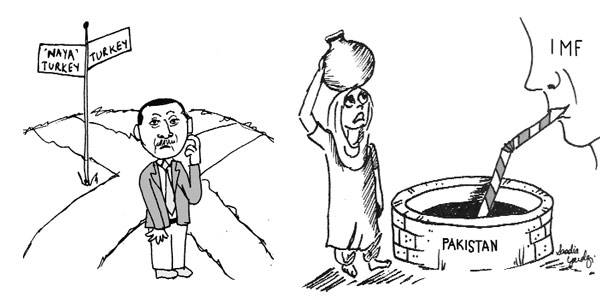
Let’s change our bank
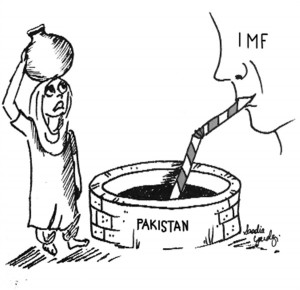
Sir,
The ongoing economic chaos and dissatisfaction of the International Monetary Fund (IMF) over the policy changes regarding independence of State Bank of Pakistan has paved way for greater involvement of the Fund in the working of the State Bank of Pakistan (SBP). This will force Pakistan to park all of its miseries and challenges at the door step of some other lending agency.
Till now the disbursement of each tranche is preceded by an evaluation of the performance of the country in achieving certain hard conditions, some of which may even prove to be growth impeding. The latest tranche of $555.9 million, released in June 2014, re-enforces the strict conditions of increasing tax revenues, bringing about reforms in the energy sector, ensuring independence of the State Bank, raising interest rates and promising privatization of state-enterprises which are facing losses.
Moreover, the condition to prepare a mini-budget under directions from IMF forced Pakistan to further cut down developmental expenditure in order to cover up the deficit and has put greater pressure over electricity bills and taxes. With conditions that subdue economic growth in the longer run, Pakistan needs to be on the lookout for better opportunities to set its growth targets in the right direction.
In the current scenario, for economic assistance Pakistan should join alliance of emerging economies of the developing world, Brazil, Russia, India, China and South Africa, collectively known as BRICS, as they announced the inauguration of a new financial institution, The New Development Bank (NDB).
With a $50 billion capital to start with for infrastructure development of the nations in need and a $100 billion agenda under the Contingent Reserve Arrangement (CRA) to help countries in financial crises, the NDB surely does come up as a competition to the World Bank and IMF.
BRICS constitute about 40% of the world’s population, but that hasn’t given them any greater voting rights in the IMF and the World Bank. NDB is formed with assigning one vote to each member and gives no country any veto power. The only hinge is that NDB’s funds are only for BRICS for now, but they do assure membership to other nations soon.
The one-prescription-for-all recipe of the IMF has had devastating impact on many countries, resulting in vast human suffering and widespread unemployment. Every country in need faces financial and institutional problems of its own and applying the same formula of tight macroeconomic policy and austerity measures can even make matters worse in countries (some good examples can be of Ukraine, Greece and even Pakistan). The macroeconomic formula of the West does not involve a human aspect for developing countries. The NDB, on the other hand, will assure due representation of the developing countries in the international market and cater to their specific needs, including poverty reduction and efficient resource mobilization. It also gives the hope of lesser conditions to be fulfilled by the borrowing countries, giving more independence to countries to implement their own policies. Developing nations were not satisfied with the developmental funds allocation of the World Bank.
As far as the gains to Pakistan are concerned, once BRICS open up membership to NDB, Pakistan can benefit from a new source of financial and development help. Having friendly relations with China, who hosts the headquarters, Pakistan can expect empathetic terms of borrowing. Even though the first President of NDB will be from India, with which Pakistan has some political friction, China is still the biggest contributor to the fund with an overshadowing contribution of $41 billion, giving it a stronger position.
There will be however, one important choice for Pakistan to make once NDB starts operating: whether Pakistan wants to turn to BRICS for future financing purposes or whether it prefers to build its credibility with Washington by sticking to the Bretton woods Institutions. Whatever the decision of Pakistan, the global economic order is surely on a turn of a new page.
Ayesha Qaisrani,
Islamabad.
Devil and the deep sea
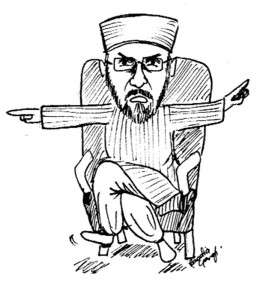
Sir,
The Inqilab and Azadi March revolutionaries are calling for a change, but look at choices they offer. The choice is between the devil and the deep sea. All that is on offer is the status quo that exists following the emergence of PML-N as the single largest majority party in the National Assembly in the 2013 elections with their poor governance, or the status quo that existed prior to 2008, with a uniformed president at the helm and his rampant unchecked abuse of power and likes of Shujaat, Khurshid Kasuri, Sheikh Rasheed, Pervaiz Elahi and revolutionaries like Mustafa Khar, Sardar Assef, Azam Swati etc talking about ridding this country of feudalism, poverty and illiteracy.
What Pakistan needs is rule of law, supremacy of the constitution, more democracy, a credible system of checks and balances, more direct taxes and a government which reverts back to its obligatory constitutional duties to offer education, health, justice and security to people.
While addressing army officers on 14 June 1948 at the Staff College Quetta, the Quaid-e-Azam said: “I am persuaded to say this because during my talks with one or two very high ranking officers I discovered that they did not know the implications of the oath taken by the troops of Pakistan, Of course, an oath is only a matter of form, what are more important are the true spirit and the heart.”
Elected and paid public servants should also adhere to the spirit of the oath that they voluntarily took to uphold the constitution, which unfortunately they have failed in doing, and hence landed Pakistan in a perpetual state of turmoil, diminishing financial reserves and ever rising deficit between revenues and expenditures, with no fiscal space to address the problems of masses.
Ali Malik,
Lahore.
Foul play?
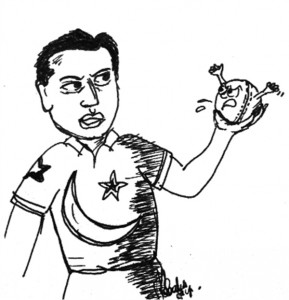
Sir,
There is a lot of criticism by Pakistanis on social media that ICC’s ban on Saeed Ajmal is not justified and the Indian dominated ICC has not made the right decision.
I am not in a position to say whether this decision was right or wrong. But recently, India’s Supreme Court gave investigators another two months to probe the allegations of corruption in cricket as they blocked a bid by ICC president N Srinivasan to resume his role as head of the national board.
If any person from Pakistan were facing these charges, I am quite sure that everyone in the cricket world would be saying he should be removed from the ICC chairman’s post until his name has been cleared by the apex court.
Mubashir Mahmood,
Karachi.
What happened in Punjab
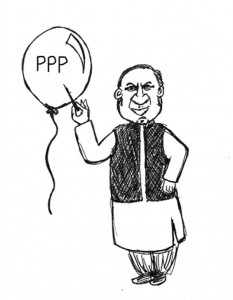
Sir,
Nothing could be further from truth than PPP referring to large scale allegations of electoral rigging as reason for their wipeout from Punjab. Zulfikar Ali Bhutto won landslide not from Sindh but Punjab, because he won the hearts and minds of people, giving them hope amidst promises of reform and social justice. PTI benefited from PPP’s loss in Khyber Pakhtunkhwa and Punjab and it can gain in the next elections if it treads the path of constitutional struggle and wait for the fallout from PML-N’s incumbency and the poor governance style of the party, whose poor decision-making has left most loss making state-owned enterprises without a credible leader, and who is refusing to tax the rich.
Punjab has never voted on the basis of ethnicity. PPP’s poor performance in the polls in 2013 was because of its poor governance, corruption, worsening law and order, abject neglect of rise in terrorism and their perceived patronization of criminal mafia, land grabbers and black economy.
There was this endless saga of plunder in state-owned enterprises by semi-literate cronies of the PPP hierarchy and jobs being sold to burden the already over-staffed companies making huge losses. Not even Hajj and Umra pilgrims were spared by the greed of those at the helm.
The PML-N won more because of the backlash against PPP than its own manifesto. In addition to this, with all his faults, the Punjab government headed by Shahbaz Sharif, fared far better in comparison to other provincial governments. Billions were earmarked for development in Sindh, but there is nothing to show on ground. So people voted based on the choices they had, and the PPP suffered a humiliating defeat because it had failed miserably in the last five years.
Tariq Ali,
Lahore.
Better than cure
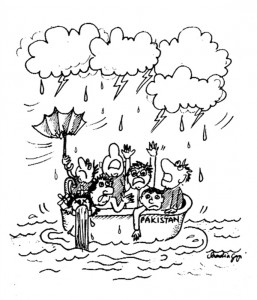
Sir,
A devastating flood has struck the country yet again. This year, it has ferociously hit major parts of Punjab, killing hundreds, destroying thousands of acres of cultivatable land and crops, devouring a large number of cattle, and submerging hundreds of houses belonging to poor farmers.
This tragic scenario may, as always, move all and sundry, who are genuinely sympathetic towards he victims of such nerve-racking occurrences. But this is nothing new. Floods of such magnitude, or even worse, have occurred in this country in the not-so-distant past. As a matter of fact, devastating floods such as the one that has hit Punjab today, have become a perpetual problem for particularly the deprived segments of our society living in rural areas.
It is extremely unfortunate that those at the helm of affairs in this country, who are responsible for devising effective ways and means to control such catastrophes, seem to be the least concerned. Evidently, no effort whatsoever has been made to plan and implement strategies to control the perpetual menace of floods that come and cause massive destruction to the lives and properties of the poor. Needless to say, it it also causes mammoth losses in economic terms.
The popular adage ‘prevention is better than cure’ is what is needed to be followed, in letter and spirit, to deal with the situation effectively. If those who claim to be the benefactors of the downtrodden of this country continue to be callous in dealing with such menacingly critical national issues, the poor masses are bound to face devastation of even grater magnitude, caused by floods, in the years ahead.
M Fazal Elahi,
Islamabad.
Talking Turkey
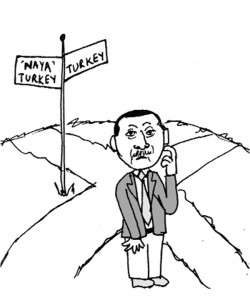
Sir,
“The days of military coups, with so-called democratic periods in between when the military kept a constant watch over politics, is now over.” These words are being commonly used to describe Erdogan’s win in the first ever held Turkish public presidential vote in Turkey.
As seven of the eleven presidents before Erdogan were retired generals, the significance and impact of a politician of non-military background appointed to Çankaya Palace is under review at national, regional and global level.
Although, this is the third time in Turkey’s political history that a prime minister has been elected president – Turgut Özal (1989), Süleyman Demirel (1993) and Erdogan (2014). But before Özal, there was no incumbent president. When Özal died, Demirel was given charge of the president’s office without elections. Therefore, Erdogan’s example of a popularly elected president is the first of its kind.
Although many foreign observers have endorsed Turkish presidential elections, several analysts are also pointing out electoral flaws, questioning the authenticity of the results. Constitutionally, Article 101 prohibits the president from being affiliated with any political party. Thus, legally Erdogan’s ties with the ruling Justice and Development Party (AKP) should be severed and his term as a member of Parliament should end. But the president-elect continues to hold party chairmanship. But still, there is little doubt about Erdogan’s victory this year and his re-election in 2019.
As presidential elections are now over and nomination of the new PM is done, analysis at present should focus on the significant political transformation Turkey is ready to undergo, from a parliamentary to presidential system. Questions that need examination are: why is there a necessity to bring constitutional changes and transformation in Turkey’s political system? What is the history and founding notion of this transformation? Which factors can contribute to the success or failure of this political transformation? And what kind of political ontology is Turkey going to adopt?
At this critical juncture, Erdogan has to make some hard choices, explained henceforth.
Firstly, an inherent incompatibility has been created in Turkish parliamentary system by conducting presidential elections through popular vote. To end this incongruity, Turkey should opt between presidential and semi-presidential systems.
Secondly, to keep letter and spirit of constitution, Erdo?an needs to quit the chairmanship of AKP. Moreover, according to Article 128 of AKP’s charter, 70 AKP members cannot run for parliamentary elections next year. This has raised concern for holding AKP together because in the past, when Özal and Demirel got elected as presidents, their parties (Motherland Party and the True Path Party) were either defeated or visibly weakened. Hence, Erdogan either has to revoke three-term ban or lead the party from behind the scenes, both of which will enhance complexity of Turkish politics.
Thirdly, although the Turkish constitution grants various powers to the president, wide-ranging executive powers are held by the PM. Possibly, if AKP gets replaced with a new ruling party after 2015 general elections, a crisis can erupt between two power-sharers. Thus, the preservation of political integrity, vibrancy and governability of AKP is crucial during the transition period.
Fourthly, a prevention of a major political crisis necessitates formulation of a new constitution. Since 2007, Erdogan’s idée fixe is to replace current constitution. For several reasons he has failed to do so. Foremost factor was AKP’s lack of possession of 330 seats in Parliament, second was failure to create consensus among political parties on issues such as governing system, language, citizenship etc.
The fifth challenge is to create good chemistry between President Erdo?an and PM-designate Ahmet Davutoglu. Analysts consider the “Erdogan-Davutoglu” formula the right one to effectively lay down foundations of new Turkey.
The sixth challenge for Erdo?an is to build ‘New Turkey,’ for which he needs to reach out to various social groups with a policy of reconciliation. One silver lining might be settlement of Turkey’s long-running tensions with its Kurdish minority.
Lastly, to continue ruling the masses, Erdogan need to maintain his popularity by avoiding drawbacks that have in last few years raised suspicion eg the crackdown on Gezi protesters, the violent outburst against a protester in Soma, or the steps Erdogan took to control media and ban social media.
Summing it up, it can be said that Erdogan remains fully aware of his exceptional role in Turkey’s political history. He must now exploit his position, during transition period, to usher in an era of major restoration and construction.
Asiya Mahar,
Islamabad.

